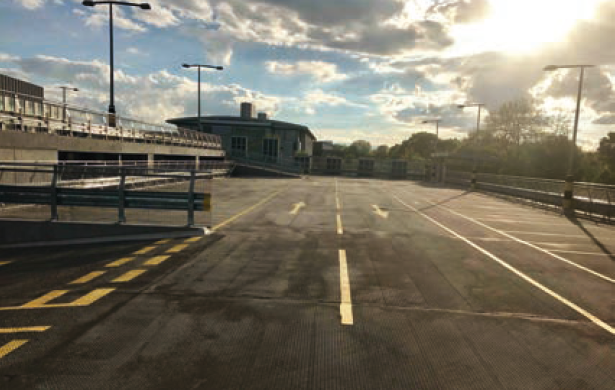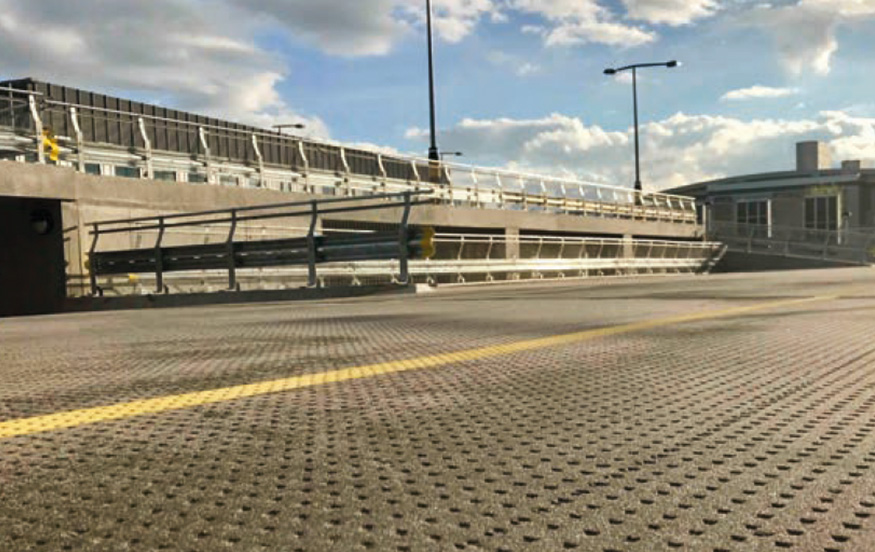One of the distinct advantages of mastic asphalt is its versatility and speed of application. In recent years and months, there has been an influx of projects where mastic asphalt screeds have been used to provide a stable and cost-effective base for waterproofing applications – from green roofs to car park decks. Made from selected bitumens, limestone fillers and specially graded aggregates, mastic asphalt screeds offer advantages over traditional cement screeds which can be slow to cure and labour intensive.
By contrast, there are mastic asphalt screeds on the market that cure rapidly even in inclement weather conditions and can be walked on within just 60 minutes, making them ideal for fast-track projects where other trades are waiting to get to work and the screed needs to trafficked or overlaid quickly. Mastic asphalt screeds have zero water content, eliminating the time taken for moisture to evaporate in traditional screeds and eradicating the risk of cement stained water penetrating into the underlying structure.
The flexibility and fast curing times of mastic asphalt screeds enable roofing contractors to achieve precise drainage falls quickly and more efficiently, level out uneven substrates and provide a stable base for a specified roofing deck system. Laid at a minimum thickness of 10mm, the screed thickness is up to 80% less than traditional materials, making it much lighter and equally suited for both refurbishment and new build projects.
Mastic asphalt screeds are available in three grades – light, medium and heavy – and can be supplied directly to site in purpose-built, hot-charge transporterscapable of holding 6 to 18 tonnes of material. It is also available in block form for re-melting on site.
Able to be applied to in-situ and precast concrete, timber and plywood, mastic asphalt screeds are suitable for use below cold roofs, insulated warm roofs, inverted insulated roofs, green roofs, balcony and terrace applications, walkways, footbridges and both car park and HGV service decks. For full waterproofing protection, mastic asphalt screeds can be overcoated with mastic asphalt roofing systems, as well as other roofing systems such as felt, hot melt roofing, liquid coatings and single ply roofing.
Recent projects involving the use of mastic asphalt screeds include the Project Sapphire Granta Car Park in Cambridge. Granta Park is a £35 million development for TWI and BioMed Realty Trust, Inc. comprising a purpose-built Science Park covering 120 acres. A number of new office buildings have been created as part of the development, including an elevated car park to service the Science Park.
An effective waterproofing system was required for application to the deck of the car park on the first office development and the specified system needed to be able to meet the challenges posed by the project, not least of all very limited timeframes in which the application could be carried out. The client had also previously experienced failure with cold applied systems, so was eager to use a time proven waterproofing system.
The roofing contractor recommended a hybrid system to meet the design criteria, comprising of IKO Permascreed – a mastic asphalt screed and levelling solution – to alleviate ponding issues created by insufficient falls in the structural deck. The screed was to be overcoated with IKO Permaphalt – a high performance, polymer modified mastic asphalt roofing system. The specification was accepted for the 1,600m2project and strict quality control was carried out throughout.
 A mastic asphalt screed was also specified for the Broadway Plaza leisure complex in Birmingham for a 4,500m2waterproofing application. Carried out by Rio Asphalt and Paving Ltd on behalf of client Aviva, the car park had suffered from extensive water ingress since the original construction in the early 2000’s, resulting in the closure of large areas of the car park. The project was made more complex by the fact that the original waterproofing was buried below sand, cement and paving slabs.
A mastic asphalt screed was also specified for the Broadway Plaza leisure complex in Birmingham for a 4,500m2waterproofing application. Carried out by Rio Asphalt and Paving Ltd on behalf of client Aviva, the car park had suffered from extensive water ingress since the original construction in the early 2000’s, resulting in the closure of large areas of the car park. The project was made more complex by the fact that the original waterproofing was buried below sand, cement and paving slabs.
IKO Permascreed mastic asphalt screed was specified to act as a fast curing, water-free sub base to remove the irregular surface of the original concrete deck and provide a permanent waterproofing solution. The chosen system enabled rapid installation as it was moisture free, rapid curing and waterproof at the point of laying.
Using mastic asphalt provided additional environmental benefits in that the project required 230 tons of zero carbon mastic asphalt. Overall a total of 1430 tonnes of material were removed from site, with only 45 tonnes being sent to landfill, representing major environmental benefits.
The Broadway Plaza project was a unique scheme with its own challenges, on a live, vibrant and busy site with access required at all times. Work could only be undertaken between agreed hours and if the work was considered too noisy or disruptive at any time, the client had the authority to stop work.
It was essential that the application was completed in phases to maintain full access to the tenants and general public. This required a huge amount of planning and co-ordination on site to not only limit disruption to all parties, but to leave the site clear and operational as each phase was completed. Disruption was kept to a minimum by having the mastic asphalt screed delivered inblock form for re-melting on site,allowing the team to complete smaller areas, whilst larger areas could be installed via hot charge. Completion of the project was achieved with no premises being closed for any period of time and with no works halted at any point.
This article featured in the September issue of RCi magazine. To read it in full please visit: https://www.rcimag.co.uk/digitaledition/rci-sep-2018/page_83.html

